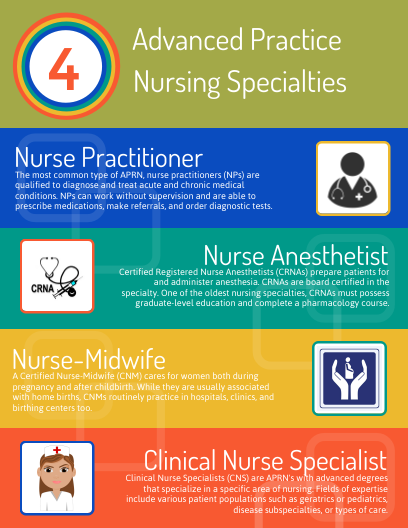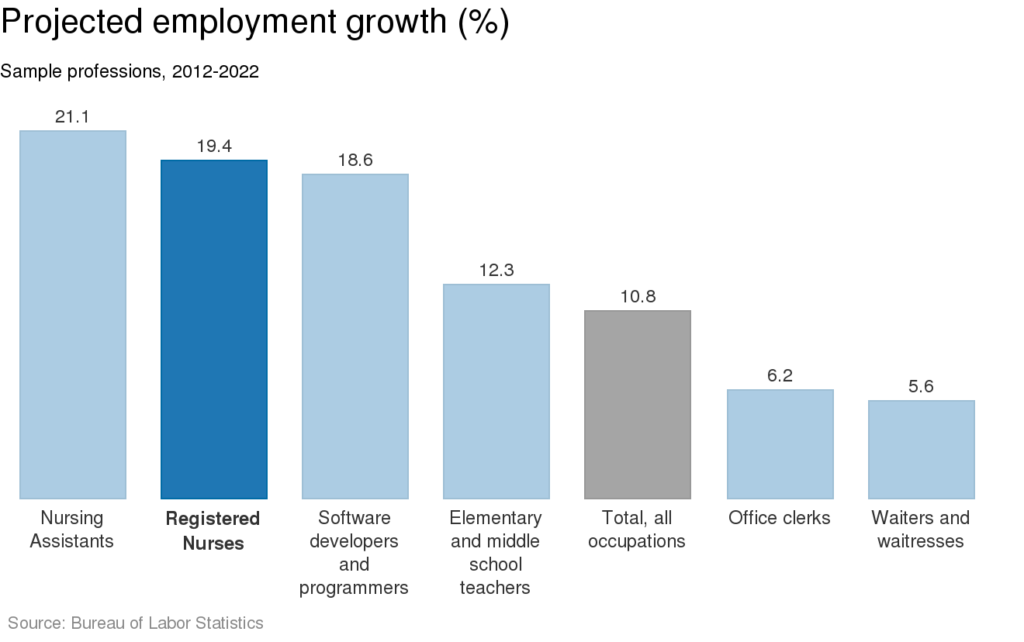What to Expect When Pursuing a Nursing Career
Nursing is one of the US’s biggest healthcare professions, with more than 3.8 million Registered Nurses (RNs) working alongside 700 thousand Licensed Practical Nurses (LPNs) nationwide. Training takes between one and four years. Once qualified, nurses work in a variety of settings—from nursing homes, clinics and shelters, to occupational health and ambulatory services, among others.
There’s an ongoing need for trained nurses, which makes this career choice both a rewarding one and a secure one. If nursing is something you’re interested in, it’s important to do some research before you begin. In this article, we’ll guide you through some key questions you might have, including:
- What do nurses do?
- What are the different types of nursing qualifications available?
- How long does it take to become a nurse?
- What are the benefits of a nursing career?
What Do Nurses Do?
As we mentioned above, there are over 100 nursing disciplines to go into. Tasks vary based on the specialty, but most roles include the following responsibilities:
- Performing physical exams
- Coordinating patient care and making critical decisions
- Administering medications and obtaining health records
- Giving patients counseling and advice
- Wound care and other physical interventions
- Supervising staff, including nursing assistants
- Research responsibilities

The daily roles and responsibilities of nurses vary widely (Image Source).
Which Nursing Qualifications Do I Need?
Requirements will depend on what you want to do. There are two types of nursing qualifications: Licensed Practical Nursing (LPN)—also called Licensed Vocational Nursing (LVN)—and Registered Nurse (RN).
LPN/LVN Qualification
To obtain this license, you need to take and pass the National Council Licensure Examination or NCLEX-PN. Once you have this, you can perform nursing duties, but these are more limited in scope than those of an RN.
Those with an LPN can go on to pursue an Associate’s Degree in Nursing (ADN) or a Bachelor of Science in Nursing (BSN). These take between two and four years to complete.
Registered Nurses
There are several pathways to becoming an RN. The most popular route is to obtain a Bachelor of Science in Nursing, which takes four years. Some RNs then choose to complete an Associate’s Degree in Nursing (ADN), which is a technical two-year program. To practice as an RN, you must complete the National Council Licensure Examination or the NCLEX-RN exam.
Advanced Practice Registered Nurses
After qualifying as a registered nurse, some go on to earn a graduate degree, Master’s, or Doctorate to become Advanced Practice Registered Nurses (APRNs). Some of these specialties include Nurse Practitioners (NPs), Clinical Nurse Specialists (CNS), Certified Nurse-Midwives (CNM), and Certified Registered Nurse Anesthetists (CRNA). Here’s what each of these roles entails:
– Nurse Practitioner
These experts provide specialized care for patients. They work predominantly in primary and preventative care and can prescribe some medications. Nurse practitioners work in a variety of specialized areas, including child health, oncology, mental health, neonatal health, adult health, and family care, among others.
– Nurse-Midwives
These specialists provide obstetric and gynecologic care. They might work in hospitals, patient homes, and specialist birthing centers.
– Clinical Nurse Specialists
These work in a range of locations where they’re specialists in that particular area. Some might work in nursing homes, others in hospitals or community centers.
– Certified Registered Nurse Anesthetists
These specialists work in hospitals where they provide anesthesia to patients pre-surgery.
5 Things to Expect When Pursuing a Nursing Career
- A challenge. There’s a lot to learn, but with good time management skills and the right attitude, you’ll find it within your reach.
- You will gain experience in a range of fields rather than just one. If you’re not sure which pathway you want to take now, that’s fine.
- Strong time management and communication skills will be necessary during your studies and on the job.
- There will be plenty of opportunities to develop your career.
- You will make a difference.
The Benefits of a Nursing Career
From a strong job outlook to non-traditional working environments, a career in nursing is both fulfilling and economically rewarding.
Growing Employment Opportunities
There’s a growing need for nurses in the US. According to AACN, the RN workforce is “expected to grow from 3 million in 2019 to 3.3 million in 2029, an increase of 221,900 or 7%. The Bureau also projects 175,900 openings for RNs each year through 2029 when nurse retirements and workforce exits are factored into the number of nurses needed in the U.S.”

Nursing is a buoyant industry with an increasing demand for qualified, talented nurses (Image Source).
Job Security and a Varied Work Environment
For those considering a career in nursing, this continuing need represents job security and the option to grow and develop in the field. Nursing also provides the opportunity to work in non-traditional environments, including community centers, government agencies, and parks, to name a few.
A Strong Salary, with Higher Earning Potential
The average RN salary in 2021 currently ranges from $59,540 to $113,240, with the potential to increase earnings by gaining extra qualifications, working overtime, or becoming an educator.
Final Thoughts
Nursing is an incredibly rewarding and varied career, with job security that looks to continue for years to come. If you’re passionate about helping people by becoming an RN or other member of the medical community, nursing could be an ideal career choice for you.
When choosing your role, consider your disposition and overall goals. How much time are you willing to dedicate to your studies? What are your short and long-term goals? What kind of access do you have to schools and training facilities? Consider the points above and learn more about available nursing and paramedic programs from HCI.














